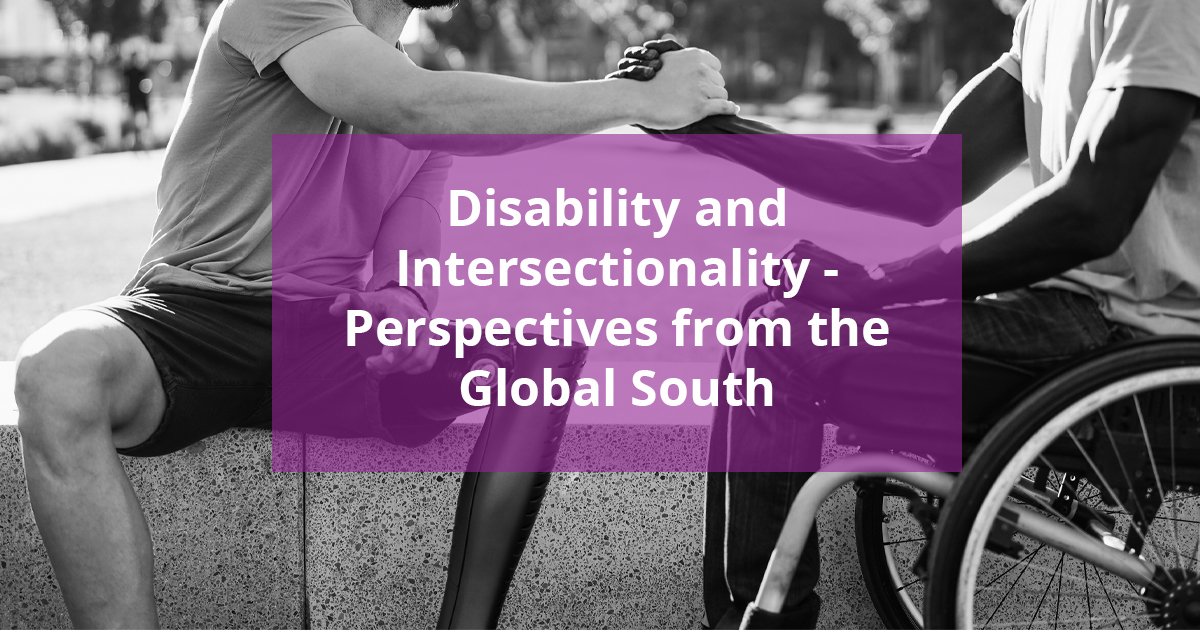The concept of intersectionality was first introduced by Kimberlé Crenshaw to describe how Black women experience multiple forms of oppression and discrimination that cannot be understood or addressed solely by looking at race or gender separately. However, the concept has since been expanded to include other forms of oppression and marginalization beyond race and gender, such as class, sexuality, ability, and age. Disability scholars such as Rosemarie Garland-Thomson, Kim Nielsen, Simi Linton and many others used the concept of intersectionality in demonstrating how social constructions of disability intersect with other social categories to create conditions of discrimination and marginalization. Rosemarie Garland-Thomson has argued that disability is not just a medical condition, but also a social and cultural category that intersects with other identities, to frame the experiences of persons with disabilities.
In the era of human rights, the concept of intersectionality has managed to invoke new ways of thinking about complexities that are experienced by marginalized people such as persons with disabilities. Intersectionality has managed to reframe our understanding of marginalisation and “creates spaces for reflexive consideration and critical engagement.” It has further helped to connect human rights to multiple forms of oppression that marginalized people experience.
Much of the work on disability and intersectionality and disability is rooted in the Global North. Over the past decade, the area of disability and intersectionality has gathered interest from scholars from the Global South, who have shown how disability intersects with poverty, low education, and ethnicity (among other social life attributes) to create multiple forms of oppression and discrimination for persons with disabilities. The purpose of this book is to consolidate the progress that has already been made and to gather new evidence with regard to how the intersectional model depicts the experiences of persons with disabilities in varied facets of life in the Global South.
The book Disability and Intersectionality – Perspectives from the Global South will be published by a reputable publisher may be Oxford, Cambridge, or Routledge.
All chapters will be subject to a rigorous peer review process.
Areas of interest that chapters must show include how the intersectional model depicts the experiences of persons with disabilities (both children and adults) in the following areas:
- Education
- Health
- Social Work
- Disaster Risk Management (DRM)
- Economic empowerment and self-reliance
- Living conditions
- Music and Sport
- Exploitation, Violence and Abuse
- Sexuality
- Older Persons
- Accessibility
- Transport
- Social Protection
- Women with Disabilities
- Justice Delivery System
- Political and Public Life
- Disability Rights
- Traditional understanding of disability
- International cooperation
- Methodological approaches to measure and/or engage with intersectionality theory and praxis.
- Gender and Queer Studies
- LGBTQ
Submission Procedure
Potential authors are invited to submit chapter abstracts of not more than 500 words, including a title, 4–6 keywords, and a brief bio, by email to zvirevo12@gmail.com and developafrica2020@gmail.com by 28 August 2023. The authors will receive a response by 10 September 2023. Chapters of approximately 6000 words (including references) will be due for peer review by November 2023. If you would like any further information, please send an email to the addresses that are given above.
About the Editors
Tafadzwa Rugoho obtained his PhD in Disability and Sexuality from Vrije Universiteit Amsterdam. He has taught at Great Zimbabwe University. He was also a guest lecturer at the University of Pretoria. Tafadzwa has authored more than 20 book chapters and journal papers. He edited two books titled Sexual and Reproductive Health of Adolescents with Disabilities (With France Maphosa) and Disability and Media – African Perspectives. He has worked for a variety of disability organizations for more than 15 years. Tafadzwa is disabled and he is a disability activist.
Christine Peta is a Disability, Policy, Research and International Development expert, who is the first Zimbabwean to obtain a PhD in Disability Studies and the third on the continent of Africa to obtain such a degree. She has wide experience working in the international development sector, as well as under several Government-United Nations partnerships and in academia including at the University of Cape Town and Stellenbosch University. Under a Government of Zimbabwe-UNICEF partnership Christine returned from the diaspora in 2018, to lead the process of making the national disability policy (a first for the country) which was launched by His Excellency the President of the Republic of Zimbabwe on 9 June 2021. Christine has written a book, book chapters and several papers that have been published in scientific journals, and that are used internationally as educational resources including in universities across the world.



